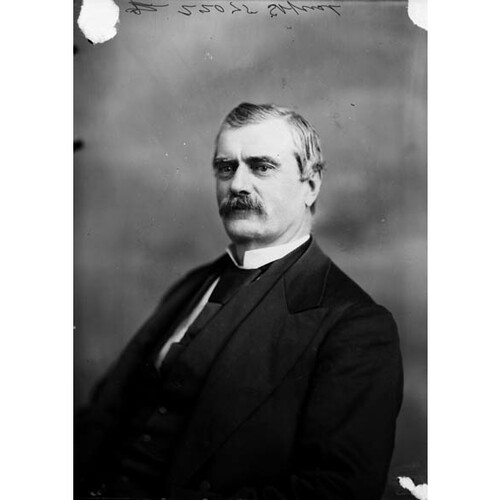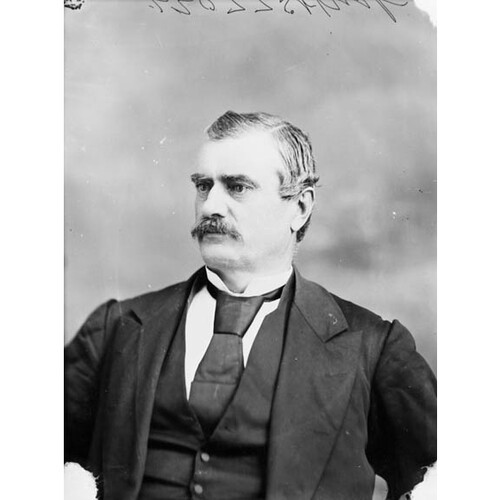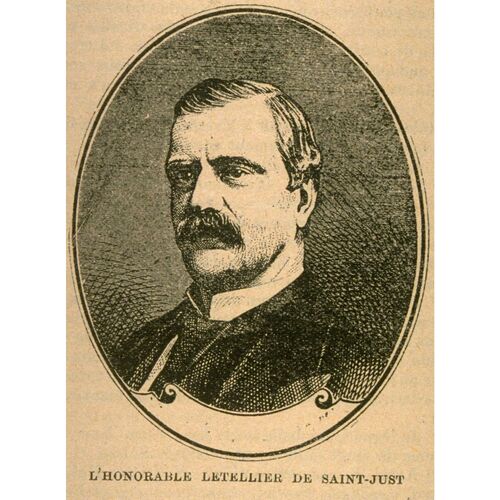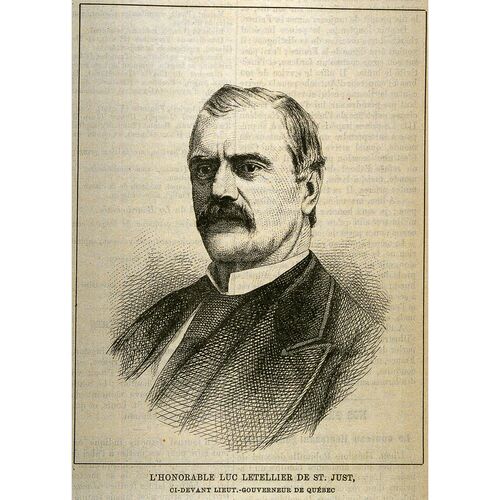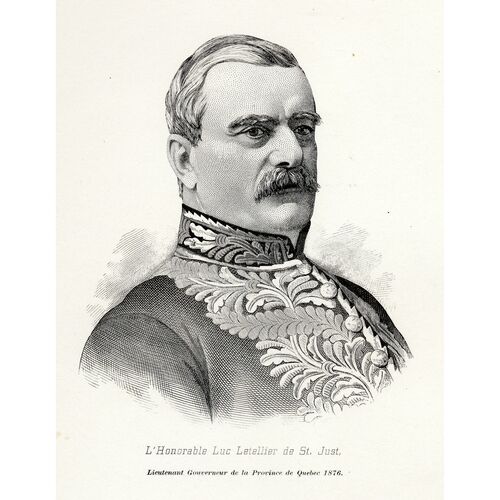LETELLIER DE SAINT-JUST, LUC (baptized Luc-Horatio), notary and politician; b. 12 May 1820 at Rivière-Ouelle, Lower Canada, son of François Letellier de Saint-Just, a notary, and Marie-Sophie Casgrain; m. 9 Feb. 1848 Eugénie-Éliza Laurent; d. 28 Jan. 1881 at Rivière-Ouelle.
Luc Letellier de Saint-Just’s ancestor, François, who came from the small town of Saint-Just, near Saint-Quentin, France, arrived in Canada with the colonial regular troops some time before 1740; that year he left the army to marry and settle in Quebec. One of his sons, Michel, represented Hertford County in the House of Assembly from 1800 to 1804. Michel’s son, François, was licensed as a notary on 29 June 1811, and took up residence at Rivière-Ouelle, where in 1814 he married Marie-Sophie Casgrain, the eldest daughter of the seigneur of La Bouteillerie. A gentleman of parts who was prominent in the social and political life of the region, François died prematurely in April 1828 of “a chest illness”; Luc, his eldest child, was not yet eight.
After attending primary school in Rivière-Ouelle and Kamouraska, Luc Letellier de Saint-Just studied at the Collège de Sainte-Anne-de-la-Pocatière from 1830 to 1836. Though inclined as a student to be rather indolent, he was cheerful and impulsively generous, capable moreover of firmness and tenacity when he set his mind on a particular goal. At the college he began to demonstrate unusual ability as a speaker. He went to the Petit Séminaire de Québec to complete his education, graduating with Pierre-Joseph-Olivier Chauveau in the tragic year of 1837.
His maternal uncle, Judge Philippe Panet*, had taken him under his wing, and on his advice Luc began a training period with Pierre Garon, a notary at Rivière-Ouelle, who treated him as a son. He was commissioned a notary in 1841, and soon acquired a clientele among those prominent in the district of Rivière-Ouelle. An accomplished horseman and a sportsman who liked hunting and fishing, he led the life of a country squire, taking a growing interest in politics which he followed in Le Courrier des États-Unis (New York) and other sources, and discussed in the drawing-rooms of leading citizens. At that period the local élite, the Letelliers, Casgrains, Chapais, and Dionnes, supported the Reform group led by Louis-Hippolyte La Fontaine*. On 6 Dec. 1847 Luc Letellier de Saint-Just assembled these families in his office to form an electoral organizing committee for the parish of Rivière-Ouelle. According to his biographer, Philippe-Baby Casgrain, about 1848 he thought of practising as a notary in Quebec, for “his clientele at Rivère-Ouelle [was] not very lucrative”; it is not certain that he carried out this plan to move. A “young aristocratic dandy,” Letellier was, according to Mgr Henri Têtu, “idle and easy-going,” preferring politics to horses and horses to his professional practice. In December 1850 he was at Rivière-Ouelle, fully determined to succeed Pierre Canac, dit Marquis, the representative for Kamouraska who had died on 26 Nov. 1850. Political unanimity no longer existed. By January there were two candidates: businessman Jean-Charles Chapais and notary Letellier de Saint-Just. Both drew their support from family connections and local rivalries, some of which dated from the division of the parish of Rivière-Ouelle in 1840. Both candidates had similar programmes based on a manifesto approved by the electors on 31 December, apparently through the initiative of the supporters of L’Avenir of Montreal. But Chapais was closer to the clergy and the ministerialists, and Letellier to L’Avenir and the Reform party organizers of Kamouraska. This campaign was the beginning of the legendary battles between the Chapais and the Letelliers, which in the coming decades were marked by brawls, corrupt practices, sensational interventions by parish priests, and electoral contests that eventually were incorporated into the political folklore of Quebec. On 1 Feb. 1851 Letellier beat Chapais by 59 votes. According to his opponent, the young “dandy” had transformed himself into “a sort of clown wearing a hooded greatcoat of grey cloth, and armed with a stubby, black pipe, [who went about] dispensing handshakes.” But Letellier held his seat for only a few months. Chapais had his revenge in the general elections of December, and retained his seat in 1854 and 1857 through the support of the parish priests who suspected Letellier of rougisme.
Letellier was elected legislative councillor for the division of Grandville in 1860, and on 16 May 1863 was appointed minister of agriculture in the Liberal cabinet of John Sandfield Macdonald* and Antoine-Aimé Dorion*. Ministerial instability was a characteristic of the political life of the period; ministries crumbled like houses of cards. On 29 March 1864 the Liberal government fell, the Conservatives returned to power, and it was Chapais rather than Letellier who obtained a portfolio.
A change in the form of government was advocated, largely to escape the deadlock. Chapais became one of the builders of confederation. Letellier, on the other hand, was one of those who fought the project, to no avail, for the sake of both the autonomy of all the provinces and the future of French culture, and in opposition to the centralizing nature of the new régime. “I frankly admit,” he stated, “that I would prefer a legislative union between Upper and Lower Canada, with inequality of representation in the Lower House and equality in the Upper House accepted in order to ensure to the two provinces reciprocal guarantees for their respective institutions.” Once confederation was achieved, however, he rallied to it as did most of its opponents, and on 23 Oct. 1867 he agreed to represent the division of Grandville in the Senate.
As leader of the Liberal party in the Senate, Letellier still hankered after electoral battles. He entered the political fray indirectly by supporting the candidacy of Charles-Alphonse-Pantaléon Pelletier* against Chapais in the provincial elections of 1867; this electoral campaign degenerated into a general free-for-all. Letellier would not have been averse to sitting in the Quebec Legislative Assembly, particularly as leader of the Liberal party, but to realize his dream he had first to get elected. Dogged by ill luck, however, he suffered his fifth consecutive defeat in the Kamouraska by-election on 11 and 12 Feb. 1869; this was followed by another defeat in L’Islet in the 1871 general election. Until 1875 Letellier had to content himself with being the secret power behind the Quebec Liberals. In the 1872 federal elections he was the Liberal organizer for the south shore, where he succeeded in getting all his candidates elected, from Lévis to Gaspé.
In November 1873 the Liberals under Alexander Mackenzie* took office in Ottawa, following the resignation of Sir John A. Macdonald*’s cabinet on the 7th. Finally Letellier was to know success. Mackenzie appointed him minister of agriculture and co-leader, with Richard William Scott*, in the Senate. More a politician than an administrator, Letellier de Saint-Just was one of the most dreaded foes of the Conservative party. As a minister, he was instrumental in securing the decision of Governor General Lord Dufferin [Blackwood*] to commute the death sentence pronounced upon Ambroise-Dydime Lépine*, Louis Riel’s right-hand man. He also played an important part in obtaining the dispatch to Rome of a report protesting clerical meddling in the elections, and in the repatriation to Manitoba of Canadians who had emigrated to the United States. His term of office was, however, darkened by the death in May 1876 of his wife, who left him with several children and two nieces they had adopted in 1861. Letellier never fully recovered from the shock.
Late in 1876 the lieutenant governor of Quebec, René-Édouard Caron*, passed away after a long illness. On 15 December Alexander Mackenzie, after some hesitation, appointed Letellier lieutenant governor rather then Joseph-Édouard Cauchon because of the latter’s unpopularity. Mackenzie parted reluctantly with such a brilliant second in command. Letellier took his new duties seriously. He enjoyed the ceremonies and the fashionable life at Spencer Wood (Bois de Coulonge, Sillery, Que.), the lieutenant governor’s official residence, where he lived in princely style. But he had a predilection for active political life and party strife. The tranquillity of Spencer Wood did not really suit him. He meddled in the political contests of the lower St Lawrence River counties, criticized on occasion the decisions of the Conservative cabinet of Charles-Eugène Boucher* de Boucherville, and even refused to sign an order in council. Where Letellier de Saint-Just claimed to be acting on principle, the Conservatives saw only partisan motivation. Boucher de Boucherville endeavoured to conceal the latent conflict; the attorney general, Auguste-Réal Angers*, a blunt man who had already been involved in the electoral confrontations down river, came to the point of curtly refusing invitations to Spencer Wood. The mutual distrust between Angers and Letellier surfaced over railway policy, which was of crucial importance at that period and was creating difficulties for the government of Boucher de Boucherville. Every region and town was clamouring for a railway, considered the key to economic progress, but the government, with its small budget, could not subsidize all the lines. Municipalities, dissatisfied with the routes proposed, refused to pay their share. Angers’s announcement that he intended to take a tough line provoked indignant reaction.
Letellier did not agree with his ministers on the railway question. Without consulting the federal government to which he was subject, but probably aware that he would have the support of the Liberals in the legislature, he dismissed Boucher de Boucherville’s Conservative government on 2 March 1878. And he entrusted the Liberal leader, Henri-Gustave Joly*, who did not have a majority in the house, with the task of forming a new government. It was a partisan act; it also created a sensation. The Conservatives protested that it was a coup d’état. The Ottawa Liberals were dumbfounded: Mackenzie and Wilfrid Laurier* privately condemned Letellier’s action, and Luther Hamilton Holton* turned down a post in Joly’s cabinet. The province was in a state of turmoil. A general election would be necessary to settle this great dispute. Joseph-Adolphe Chapleau* opened the campaign with his famous cry: “Silence the voice of Spencer Wood and let the mighty voice of the people speak.” However, despite the fire and eloquence of Chapleau, the electors gave their approval to Letellier.
All was well as long as the Liberals were in power in Ottawa, but in September 1878 Macdonald and the Conservatives were returned in strength. The Bleus of the province of Quebec, furious with the author of the coup d’état, demanded his removal from office. That would be another act of grave significance. Macdonald hesitated, temporized, and sent two of his ministers to England to consult the imperial government, which dumped the matter back in his lap. Chapleau’s friends persisted; they virtually engaged in conspiracy, with Joseph-Alfred Mousseau, the member for Bagot in the House of Commons, as their principal spokesman, and he proved tenacious. Finally, the Macdonald government removed Letellier, and on 25 July 1879 appointed a Conservative, Théodore Robitaille*, as his successor.
Letellier retired, financially ruined and physically broken. He had been stricken with a heart attack in May and given last rites, and had only partially recovered his health. But he was a fighter. He sent his family to Rivière-Ouelle, and went to Quebec to live in a friend’s house. He remained near his doctors, and especially his friends, with whom he was ready to continue the struggle by meeting with the Liberal organizations of Quebec and Ontario. But his health no longer matched his courage. He suffered a second heart attack and retired, a sick man, to his son-in-law’s house in Ottawa. In May 1880 he returned to Rivière-Ouelle, where he died on 28 Jan. 1881.
Almost all the papers of the chief political figures of the period from 1876 to 1880, as well as the newspapers, contain references to the coup d’état and to Luc Letellier de Saint-Just. These should be consulted for a full examination of his career.
AP, Rivière-Ouelle, Reg. des baptêmes, mariages et sépultures, 13 mai 1820, 9 févr. 1848, 2 févr. 1881. Que., Assemblée législative, Journaux, 1877–80. Le Canadien, 5–17 févr. 1881. Montreal Herald and Daily Commercial Gazette, 31 Jan. 1881. L’Opinion publique, 4, 11 janv. 1877; 7 août 1879; 3, 17 févr. 1881. CPC, 1873–78. J. C. Dent, Canadian portrait gallery, I: 47–53. Julienne Barnard, Mémoires Chapais; documentation, correspondance, souvenirs (4v., Montréal et Paris, 1961–64). P.-B. Casgrain, Étude historique: Letellier de Saint-Just et son temps (Québec, 1885). M. Hamelin, Premières années du parlementarisme québécois. P.-H. Hudon, Rivière-Ouelle de la Bouteillerie; 3 siècles de vie (Ottawa, 1972). Rumilly, Hist. de la prov. de Québec, I–II. Henri Têtu, Histoire des families Têtu, Bonenfant, Dionne et Perrault (Québec, 1898), 401–5. Alpheus Todd, Parliamentary government in the British colonies (London, 1880). J.-C. Bonenfant, “Destitution d’un premier ministre et d’un lieutenant-gouverneur,” Cahiers des Dix, 28 (1963): 9–31.
Cite This Article
Robert Rumilly, “LETELLIER DE SAINT-JUST, LUC (baptized Luc-Horatio),” in Dictionary of Canadian Biography, vol. 11, University of Toronto/Université Laval, 2003–, accessed June 22, 2025, https://www.biographi.ca/en/bio/letellier_de_saint_just_luc_11E.html.
The citation above shows the format for footnotes and endnotes according to the Chicago manual of style (16th edition). Information to be used in other citation formats:
| Permalink: | https://www.biographi.ca/en/bio/letellier_de_saint_just_luc_11E.html |
| Author of Article: | Robert Rumilly |
| Title of Article: | LETELLIER DE SAINT-JUST, LUC (baptized Luc-Horatio) |
| Publication Name: | Dictionary of Canadian Biography, vol. 11 |
| Publisher: | University of Toronto/Université Laval |
| Year of revision: | 1982 |
| Access Date: | June 22, 2025 |


![L'Honorable Luc Letellier de St. Just. Lieutenant Gouverneur de la Province de Québec, 1876 [image fixe] Original title: L'Honorable Luc Letellier de St. Just. Lieutenant Gouverneur de la Province de Québec, 1876 [image fixe]](/bioimages/w600.4832.jpg)
